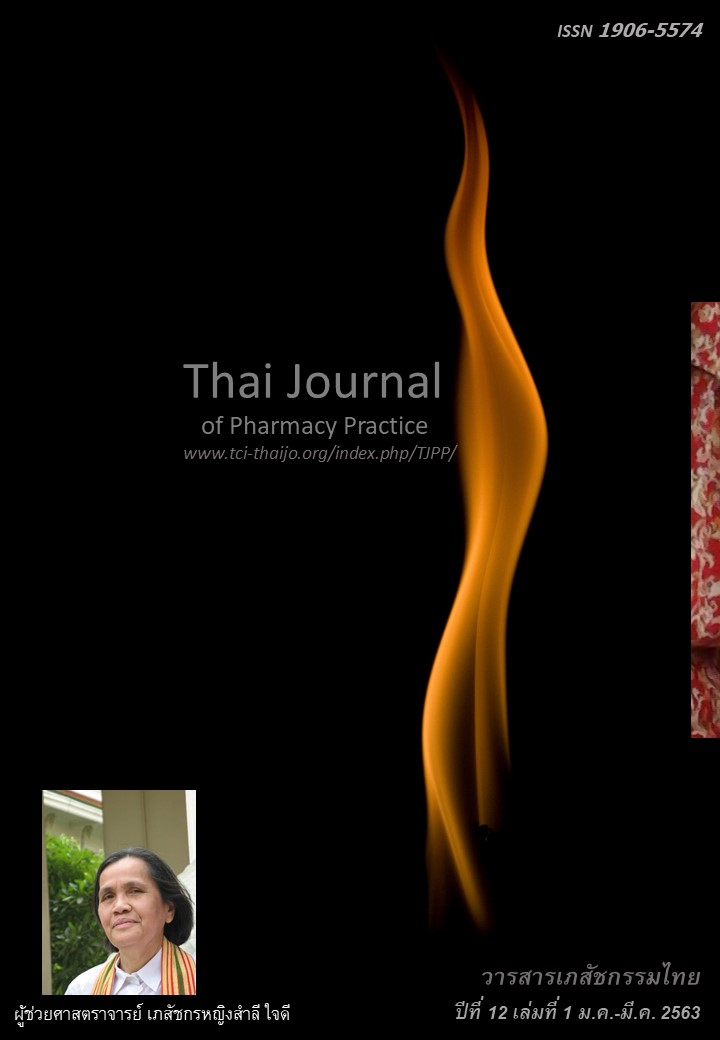ความคิดเห็นของแพทย์ต่อการปฏิบัติตามนโยบายการส่งเสริมการใช้ยาอย่างสมเหตุผล: กรณีศึกษาจังหวัดแห่งหนึ่งในภาคตะวันออกเฉียงเหนือ
Main Article Content
บทคัดย่อ
วัตถุประสงค์: เพื่อศึกษาความคิดเห็นของแพทย์ต่อการปฏิบัติตามนโยบายการส่งเสริมการใช้ยาอย่างสมเหตุผล วิธีการ: การวิจัยนี้เป็นการศึกษาเชิงคุณภาพ ซึ่งเก็บข้อมูลโดยการสัมภาษณ์เจาะลึกผู้ให้ข้อมูลสำคัญ 11 ท่านที่ปฏิบัติงานในจังหวัดแห่งหนึ่งในภาคตะวันออกเฉียงเหนือ ผู้ให้ข้อมูลสำคัญปฏิบัติงานในโรงพยาบาล จำนวน 9 ท่าน อีก 2 ท่านเป็นผู้บริหารที่มีส่วนเกี่ยวข้องในการดำเนินงานในโครงการโรงพยาบาลส่งเสริมการใช้ยาอย่างสมเหตุผล การศึกษาเก็บข้อมูลระหว่างเดือนเมษายนถึงเดือนมิถุนายน พ.ศ. 2561 การวิเคราะห์ข้อมูลทำโดยการวิเคราะห์เชิงเนื้อหา ผลการวิจัย: ผู้ให้ข้อมูลสำคัญเห็นว่า นโยบายการส่งเสริมการใช้ยาอย่างสมเหตุผลส่งผลให้เกิดการเปลี่ยนแปลงวัฒนธรรมการสั่งใช้ยาของแพทย์ แพทย์มีการสั่งใช้ยาตามแนวปฏิบัติในการดูแลรักษาโรคมากขึ้น นโยบายฯ ที่ผู้ให้ข้อมูลสำคัญเห็นว่าสามารถปฏิบัติตามได้โดยไม่มีปัญหาคือ การสั่งใช้ยาตามแนวปฏิบัติในการดูแลรักษาโรคที่กำหนดไว้ในประเทศหรือที่เป็นสากล ส่วนการสั่งใช้ยาปฏิชีวนะอย่างสมเหตุผลนั้น ผู้ให้ข้อมูลสำคัญเห็นว่าปฏิบัติตามได้ยาก ทั้งนี้เนื่องจากข้อจำกัดในด้านบริบทของพื้นที่ ความเชื่อเกี่ยวกับยาปฏิชีวนะของประชาชน และความกังวลหรือความกลัวของแพทย์เกี่ยวกับผลการรักษา และโอกาสเสี่ยงที่จะถูกฟ้องร้องหากเกิดความผิดพลาด การศึกษาพบว่า ผู้ให้ข้อมูลสำคัญยังมีความเชื่อมั่นว่า ยาต้นแบบมีประสิทธิภาพดีกว่ายาสามัญ และเห็นว่าการรักษาด้วยยาในบัญชียาหลักแห่งชาติเป็นข้อจำกัดที่ทำให้ทางเลือกในการรักษาของแพทย์ลดลง สรุป: ความสำเร็จของนโยบายส่งเสริมการใช้ยาอย่างสมเหตุผลขึ้นอยู่กับปัจจัยสำคัญหลายประการ โดยเฉพาะอย่างยิ่งคือการสร้างความตระหนักให้แพทย์และผู้ป่วยเห็นความสำคัญของการใช้ยาอย่างสมเหตุผล ตลอดจนการสร้างความเชื่อมั่นในประสิทธิภาพของยาสามัญและยาในบัญชียาหลักแห่งชาติ
Article Details
ผลการวิจัยและความคิดเห็นที่ปรากฏในบทความถือเป็นความคิดเห็นและอยู่ในความรับผิดชอบของผู้นิพนธ์ มิใช่ความเห็นหรือความรับผิดชอบของกองบรรณาธิการ หรือคณะเภสัชศาสตร์ มหาวิทยาลัยสงขลานครินทร์ ทั้งนี้ไม่รวมความผิดพลาดอันเกิดจากการพิมพ์ บทความที่ได้รับการเผยแพร่โดยวารสารเภสัชกรรมไทยถือเป็นสิทธิ์ของวารสารฯ
เอกสารอ้างอิง
2. Bureau of Information Office of the Permanent Secretary of Ministry of Public Health. News for the media: Ministry of Public Health set policy on “rational drug use” for the development of 15th health service system [online]. 2012 [cited July 29, 2017]. Available from: pr.moph.go.th/iprg/include/admin_ hotnew /show_hotnew.php?idHot new = 84841.
3. Committee on National Drug System Development. National drug policy A.D. 2011 and national drug system development strategy A.D. 2012-2016. Bangkok: Publishing House of Agricultural Coopera- tive Federation of Thailand; 2011.
4. Subcommittee on the Promotion of Rational Drug Use. Rational drug use hospital manual. Bangkok: Publishing House of Agricultural Cooperative Federation of Thailand; 2015.
5. Kotwani A, Joshi P. C, Jhamb U, Holloway K. Prescriber and dispenser perceptions about antibiotic use in acute uncomplicated childhood diarrhea and upper respiratory tract infection in New Delhi: Qualitative study. Indian J Pharmacol 2017; 49: 419-31. doi: 10.4103/ijp.IJP_508_17.
6. Rodrigues A. T, Roque F, Falcão A, Figueiras A, Herdeiro M. T. Understanding physician antibiotic prescribing behaviour:a systematic review of quali- tative studies. Int J Antimicrob Agents. 2013; 41: 203-12. doi: 10.1016/j.ijantimicag.2012.09.003.
7. Pumtong S, Duangchan P, Anuwong K, Sumpradit N. Lessons learnt from scaling up to sustainability of Antibiotics Smart Use (ASU). Journal of Health Systems Research 2017; 11: 500-15.
8. Sumpradit N, Hunnangkul S, Phumart P, Prakongsai P. A survey of the antibiotic control and surveillance system and measures in promoting rational use of antibiotics: Preliminary results. Journal of Health Systems Research 2012; 6: 362-73.
9. Zhang, W., Li, Y., Li, Y., Li, X., Zhao, W., & Lu, R. A cross-sectional analysis of prescription and stakeholder surveys following essential medicine reform in Guangdong Province, China. BMC Health Serv Res 2015; 15:98. doi: 10.1186/s1291 3-015-0778-3.
10. Limwattananon C, Sooksai N, Topark-Ngarm A, Waleekhachonloet O, Kitwiti P, Rattanachotphanit T, et al. Measures to promote rational use of medicines in public hospitals: a review and analysis of national policy interventions.Journal of Health Systems Research 2013; 7: 33-44.
11. Chatsom K, Limwattananon S, Limwattananon C, Waleekhachonloet O, Ratanachodpanich T. Use of branded originators among multi-source drugs in public hospitals. Proceedings of the Graduate Research Conference.Khon Kaen University.[on line]. 2013; 1051-59. [cited February 10, 2018]. Available from: gsbooks.gs.kku.ac.th/56/grc14/files/ mmp31.pdf
12. Ryu M, Kim J. Perception and attitude of Korean physicians towards generic drugs. BMC Health Serv Res. 2017;17:610. doi: 10.1186/s12913-017-2555-y.
13. Lewek P, Smigielski J, Kardas P. Factors affecting the opinions of family physicians regarding generic drugs–a questionnaire based study. Bosn J Basic Med Sci 2014; 15: 45-50. doi: 10.17305/bjbms.201 5.1.134.


